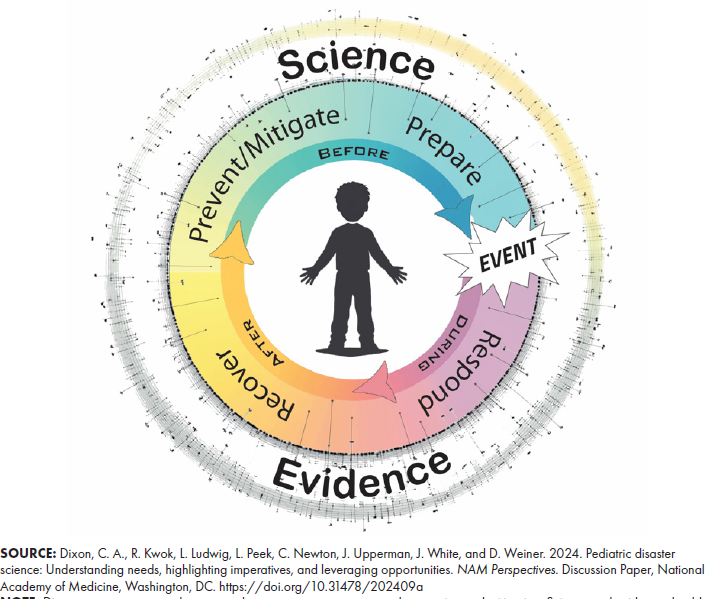Leadership
Cinnamon A. Dixon, D.O., M.P.H.
Medical Officer, Pediatric Trauma and Critical Illness Branch
Eunice Kennedy Shriver National Institute of Child Health and Human Development, NIH
U.S. Department of Health and Human Services
CDR Danny Malashock, Ph.D., M.S., R.E.H.S.
U.S. Public Health Service Commissioned Corps
Office of Radiation and Indoor Air
U.S. Environmental Protection Agency
CAPT Tarah S. Somers, R.N., M.S.N., M.P.H.
Regional Director, Agency for Toxic Substances and Disease Registry Region 1 (New England)
Centers for Disease Control and Prevention
U.S. Department of Health and Human Services
Amelia (Nguyen) Yu, Ph.D.
Designated Federal Officer, Children's Health Protection Advisory Committee
Office of Children's Health Protection
U.S. Environmental Protection Agency
Purpose
The purpose of the Subcommittee on Children in Emergencies and Disasters is to empower federal partners to collectively address gaps in health research and protection of children that arises from their exposure to public health emergencies and disasters. Such events can increase children's exposure to environmental hazards and safety hazards and increasingly, children are at risk of experiencing more than one type of event at a time or in quick succession. Such events can worsen existing health issues, cause direct health effects, and disrupt the social systems and infrastructures that help children and families address health issues. Protecting children from these risks is critical to their well-being and resilience.
The current goals of the subcommittee include:
- Strengthening federal interagency coordination and collaboration
- Building partnerships and public health awareness
- Providing expert consultation and guidance
- Facilitating development and coordination of federal research related to children in emergencies and disasters
Activities
Information Exchange
The SCED serves as a forum for dissemination and exchange of information among federal agencies and to others interested in the Task Force priority areas. Federal staff and other experts are regularly invited to present to the SCED on programs and initiatives of interest.
Interagency Engagement and Consultation
The subcommittee works to provide its combined knowledge and expertise to relevant federal activities. Examples include:
- The National Integrated Heat Health Information System on implementation of the National Heat Strategy in ways that are protective of children’s health and safety.
- The National Advisory Committee on Children in Disasters (NACCD), which provides expert advice to the HHS Secretary, on membership and goals.
- Multi-sector partners of the Action Collaborative on Disaster Research on ways to protect children and improve health care responses post-disaster and disseminate related recommendations to providers.
- Requests for Input to Strategic Plans, including those of the Eunice Kennedy Shriver National Institute of Child Health and Human Development (NICHD), the National Institute of Environmental Health Sciences (NIEHS), and the NIH Office of the Disease Prevention.
Resources
- 2014-2015 Report of the Children's HHS Interagency Leadership on Disasters (CHILD) Working Group Update (2017) (656KB)
- CDC Helping Children Cope With Emergencies
- Child Heatstroke Prevention: Prevent Hot Car Deaths
- Children and Disasters
- Disaster Research Response (DR2) Resources Portal Mental Health Effects in Children
- Emergency Medical Services for Children Program Disaster Preparedness
- Heat.gov - Children
- Wildfires and Children's Health Resources
Accomplishments
NIHHIS Heat Safety Awareness Social Media Campaign
During three weeks of the summer heat season of 2024 (early, mid, and late), the SCED participated in the National Integrated Heat Health Information System’s awareness campaign by disseminating federal messages and resources that address ways to protect children of all ages from the effects of extreme heat through the Task Force website and email list. Examples of resources include:
- CDC Heat and Health Initiative Clinical Guidance to Protect Children
- HHS Low-Income Home Energy Assistance Program (LIHEAP)
- National Highway and Transportation Safety Administration (NHTSA) Campaign to Prevent Child Vehicular Heatstroke

Action Collaborative for Disaster Research Symposia

SCED members collaborated with, helped to coordinate, and participated in two major symposia convened by the Action Collaborative for Disaster Research which operates under the auspices of the Forum on Medical and Public Health Preparedness for Disasters and Emergencies of the National Academies of Sciences, Engineering, and Medicine.
- Disaster Data Science Symposium This meeting discussed disaster science questions; shared disaster data sources; examined opportunities to increase access and utilization disaster data sources and streamline interoperability and integration of data for science and improved understanding. April 2024. Multiple sessions and presentations/use cases were pediatric-specific including:
- Head Start Environmental Exposure Mapping Tool and Resource Library
- Data Science and Lives Saved: the Story of Emergency Department Pediatric Readiness
- Health System Utilization and Dissemination in Surge Contexts: Pediatric Challenges and Adaptations during the Tripledemic
- Symposium on Pediatric Disaster Science This meeting was convened to highlight how research and evidence have the potential to improve outcomes for children at risk of experiencing or who have experienced a disaster. August 2022. Recommendations resulting from the symposia were published in Pediatric Disaster Science: Understanding Needs, Highlighting Imperatives, and Leveraging Opportunities, along with several follow-on articles in a Pediatric Disaster Science Series.

